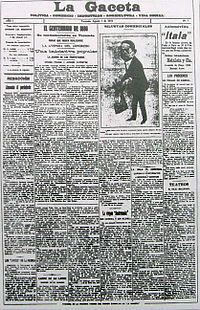Portal:Conservatism
| Main page | Showcase | Project |
Introduction
Conservatism is a cultural, social, and political philosophy and ideology that seeks to promote and preserve traditional institutions, customs, and values. The central tenets of conservatism may vary in relation to the culture and civilization in which it appears. In Western culture, depending on the particular nation, conservatives seek to promote and preserve a range of institutions, such as the nuclear family, organized religion, the military, the nation-state, property rights, rule of law, aristocracy, and monarchy. Conservatives tend to favor institutions and practices that enhance social order and historical continuity.
The 18th-century Anglo-Irish statesman Edmund Burke, who opposed the French Revolution but supported the American Revolution, is credited as one of the forefathers of conservative thought in the 1790s along with Savoyard statesman Joseph de Maistre. The first established use of the term in a political context originated in 1818 with François-René de Chateaubriand during the period of Bourbon Restoration that sought to roll back the policies of the French Revolution and establish social order.
Conservatism has varied considerably as it has adapted itself to existing traditions and national cultures. Thus, conservatives from different parts of the world, each upholding their respective traditions, may disagree on a wide range of issues. One of the three major ideologies along with liberalism and socialism, conservatism is the dominant ideology in many nations across the world, including Hungary, India, Iran, Israel, Italy, Japan, Poland, Russia, Singapore, and South Korea. Historically associated with right-wing politics, the term has been used to describe a wide range of views. Conservatism may be either libertarian or authoritarian, populist or elitist, progressive or reactionary, moderate or extreme. (Full article...)
Selected article
In the 1980s, under the Reagan Doctrine, the United States increased diplomatic, military, and economic pressures on the Soviet Union, at a time when the nation was already suffering economic stagnation. In the late 1980s, Soviet President Mikhail Gorbachev introduced the liberalizing reforms of perestroika ("reconstruction", "reorganization", 1987) and glasnost ("openness", ca. 1985). The Cold War ended after the Soviet Union collapsed in 1991, leaving the United States as the dominant military power. Russia rejected Communism and was no longer regarded as a threat by the U.S. The Cold War and its events have had a significant impact on the world today, and it is often referred to in popular culture, especially films and novels about spies.
Selected quote
To be conservative, then, is to prefer the familiar to the unknown, to prefer the tried to the untried, fact to mystery, the actual to the possible, the limited to the unbounded, the near to the distant, the sufficient to the superabundant, the convenient to the perfect, present laughter to utopian bliss.
— Michael Oakeshott, On Being Conservative (1962)
Selected image
La Gaceta was established on August 4, 1912, by Alberto García Hamilton, an Uruguayan publisher who left for neighboring Argentina following a political dispute. La Gaceta earned a reputation for conservatism, and was opposed to populist leader Hipólito Yrigoyen during the 1920s, as well as to the pro-development administration of Arturo Frondizi, who had the paper censored in 1960.
Credit: Jlazarte
Did you know...
- ... that California began celebrating Ronald Reagan Day on February 6, 2011, which would have been Reagan's 100th birthday?
- ...that the Minute Women of the U.S.A. was a militantly anti-communist organization for American housewives in the 1950s?
- ... that Theodore Dalrymple's book Our Culture, What's Left of It describes British culture as a "moral swamp"?
Selected anniversaries in December
- 1860 – the Reform War ends with the surrender of conservative General Miguel Miramón outside of Mexico City
- 1937 – a bipartisan coalition releases the "Conservative Manifesto" which was critical of President Franklin Roosevelt's New Deal policies.
- 2003 – the Conservative Party of Canada is formed
- 1834 – Sir Robert Peel publishes the Tamworth Manifesto which lays the foundation for the modern British Conservative Party.
Topics
Associated Wikimedia
The following Wikimedia Foundation sister projects provide more on this subject:
-
Commons
Free media repository -
Wikibooks
Free textbooks and manuals -
Wikidata
Free knowledge base -
Wikinews
Free-content news -
Wikiquote
Collection of quotations -
Wikisource
Free-content library -
Wikiversity
Free learning tools -
Wiktionary
Dictionary and thesaurus










